|
|
|
Sort Order |
|
|
|
Items / Page
|
|
|
|
|
|
|
| Srl | Item |
| 1 |
ID:
100685
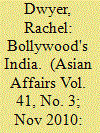

|
|
|
|
|
| Publication |
2010.
|
| Summary/Abstract |
This article propounds the thesis that Bollywood cinema, the modern Indian cinema based in Mumbai (Bombay) is a better guide to the realities of modern India than other, more scholarly works. The author, who distinguishes and describes a number of different types of Bollywood film, suggests that these films are an unparalleled guide to the thoughts, aspirations and attitudes of the hundreds of millions of members of the emergent middle classes. For example, their view of history is purveyed by the cinema, not by books written by academic historians; their attitudes to politics are formed by films, not by the speeches given by politicians.
|
|
|
|
|
|
|
|
|
|
|
|
|
|
|
|
| 2 |
ID:
143505
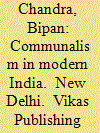

|
|
|
|
|
| Publication |
New Delhi, Vikas Publishing House Pvt Ltd, 1984.
|
| Description |
xii, 363p.hbk
|
| Standard Number |
0706925106
|
|
|
|
|
|
|
|
|
|
|
|
Copies: C:1/I:0,R:0,Q:0
Circulation
| Accession# | Call# | Current Location | Status | Policy | Location |
| 023122 | 954.052/BIP 023122 | Main | On Shelf | General | |
|
|
|
|
| 3 |
ID:
130808
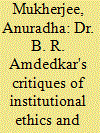

|
|
|
|
|
| Publication |
2014.
|
| Summary/Abstract |
Ethics and morality are the milestones of civilization in the true sense of the term. These concepts again are not static but evolve with greater implications and subtler nuances as humanity strives to grow towards perfection- the ultimate end of existence. ' whether biologically or spiritually. In the context of Indian thought, the traditional, age-old dictums of ethics and morality. having undergone numerous interpretations and changes have experienced a new set of values,' however latent in the traditional interpretation of Dharma or Niri- with the advent of" nationalism, the emergence of a new nation-state and the concurrent vision of human rights. The Constitution of India fully recognizes the moral as at par with the modem, that is, the western ideals of morality in the realization that in the context of Dalit uprising in modern India, the traditional ideals of ethics and morality are to be reviewed. Obviously this shows that what is legal should be ethical and moral or rather. what is ethical and moral tnust have its place in law. It is from this perspective that the modern-day Dalit struggle against injustices, age-old as they are. are to be seen and Dr.B.R. Ambedkar's initiation to this struggle was aimed at bringing ethics and morality to work at the state level, subjugating the Nili forest while lawgivers to take a backseat before the universal laws of morality. To understand Ambedkar's stand on the place of ethics and morality in Hinduism, one must see the reasons that made him strike out at the roots of Hindu social ethics. The Hindu social life was traditionally ruled by Dilemma. Dharma guided a Hindu's'Iife from birth to death by a set of rules strictly laid out for everyone in society. The observation of these rules was morality and the underlying ethics of these duties and rights was ?rst ofall, societal good, i.e., good for 'all. The second part of this ethics was that by observing this social morality, an individual will attain perfection. In accordance with these concepts, the Dharmas/zastras dictate the functions ofthe state and the king. The Nili and Dandanili emanate from one source and with one ideal- that is to maintain the social order by arranging for the speci?c duties of each and every member of society. Consequently. rights came as group rights and institutional rights as laid out in the Dharamshastra'. And over and above everything was the belief in the law of Karma that sanctified the rule of l/Z7I'l7aS/1I'uII7(l, or ones station in life as prescribed by onc's birth. These two essential features of Hindu society made it a highly stratified one so that the passage of' centuries only tightened the rules and the rituals pertaining to these two rules. The solemn and noble hymns of Rigveda. where the philosophy of Vedic seers and poets as the world being one and where everyone was the other's kin. I Va.t'zzdlmibu Kzzrumba/(um )' is the spirit of the ancient Indian Vedic realization. The utmost ideals of human dignity with the universal ethics of righteous behavior and the universal morality of conscientious behavior were preached in their fullest glory. . '
|
|
|
|
|
|
|
|
|
|
|
|
|
|
|
|
| 4 |
ID:
095714
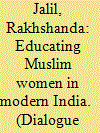

|
|
|
| 5 |
ID:
104403
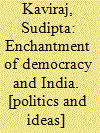

|
|
|
|
|
| Publication |
Ranikhet, Permanent Black, 2011.
|
| Description |
344p.
|
| Standard Number |
9788178242965, hbk
|
|
|
|
|
|
|
|
|
|
|
|
Copies: C:1/I:0,R:0,Q:0
Circulation
| Accession# | Call# | Current Location | Status | Policy | Location |
| 055992 | 321.80954/KAV 055992 | Main | On Shelf | General | |
|
|
|
|
| 6 |
ID:
139981
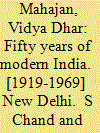

|
|
|
|
|
| Publication |
New Delhi, S Chand and Co., 1970.
|
| Description |
ix, 438p.hbk
|
|
|
|
|
|
|
|
|
|
|
|
Copies: C:1/I:0,R:0,Q:0
Circulation
| Accession# | Call# | Current Location | Status | Policy | Location |
| 005713 | 954.035/MAH 005713 | Main | On Shelf | General | |
|
|
|
|
| 7 |
ID:
028776
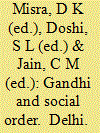

|
|
|
|
|
| Publication |
DelhI, Research Publications in Social Sciences, 19??.
|
| Description |
128p.Hbk
|
|
|
|
|
|
|
|
|
|
|
|
Copies: C:1/I:0,R:0,Q:0
Circulation
| Accession# | Call# | Current Location | Status | Policy | Location |
| 011271 | 923.254/MIS 011271 | Main | On Shelf | General | |
|
|
|
|
| 8 |
ID:
086527
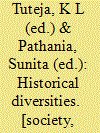

|
|
|
|
|
| Publication |
New Delhi, Manohar, 2008.
|
| Description |
468p.Hbk
|
| Contents |
Essays for Professor V N Datta
|
| Standard Number |
9788173047923
|
|
|
|
|
|
|
|
|
|
|
|
Copies: C:1/I:0,R:0,Q:0
Circulation
| Accession# | Call# | Current Location | Status | Policy | Location |
| 054128 | 954.025/TUT 054128 | Main | On Shelf | General | |
|
|
|
|
| 9 |
ID:
028766
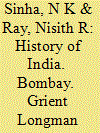

|
|
|
|
|
| Publication |
Bombay, Grient Longmans, 1973.
|
| Description |
viii, 613p. bib.hbk
|
| Standard Number |
1st ed.
|
|
|
|
|
|
|
|
|
|
|
|
Copies: C:1/I:0,R:0,Q:0
Circulation
| Accession# | Call# | Current Location | Status | Policy | Location |
| 013128 | 954/SIN 013128 | Main | On Shelf | General | |
|
|
|
|
| 10 |
ID:
001340
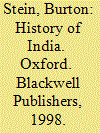

|
|
|
|
|
| Publication |
Oxford, Blackwell, 1998.
|
| Description |
xvi, 432p.
|
| Series |
Blackwell History of the World
|
| Standard Number |
0631205462
|
|
|
|
|
|
|
|
|
|
|
|
Copies: C:1/I:0,R:0,Q:0
Circulation
| Accession# | Call# | Current Location | Status | Policy | Location |
| 040852 | 954/STE 040852 | Main | On Shelf | General | |
|
|
|
|
| 11 |
ID:
145015
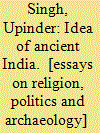

|
|
|
|
|
| Publication |
New Delhi, Sage Publications India Pvt Ltd, 2016.
|
| Description |
xlii, 439p.: tables, figureshbk
|
| Standard Number |
978935150646
|
|
|
|
|
|
|
|
|
|
|
|
Copies: C:1/I:0,R:0,Q:0
Circulation
| Accession# | Call# | Current Location | Status | Policy | Location |
| 058656 | 934/SIN 058656 | Main | On Shelf | General | |
|
|
|
|
| 12 |
ID:
058222
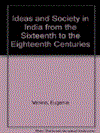

|
|
|
|
|
| Publication |
DelhI, Oxford University Press, 1996.
|
| Description |
vi, 223p.Hbk
|
| Standard Number |
0195637836
|
|
|
|
|
|
|
|
|
|
|
|
Copies: C:1/I:0,R:0,Q:0
Circulation
| Accession# | Call# | Current Location | Status | Policy | Location |
| 039883 | 954.02/VAN 039883 | Main | On Shelf | General | |
|
|
|
|
| 13 |
ID:
128734
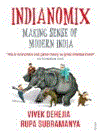

|
|
|
|
|
| Publication |
Noida, Random House Publishers India Pvt.Ltd., 2012.
|
| Description |
xxvii, 219p.Hbk
|
| Standard Number |
9788184001211
|
|
|
|
|
|
|
|
|
|
|
|
Copies: C:1/I:0,R:0,Q:0
Circulation
| Accession# | Call# | Current Location | Status | Policy | Location |
| 057640 | 330.954/DEH 057640 | Main | On Shelf | General | |
|
|
|
|
| 14 |
ID:
067365
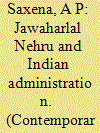

|
|
|
| 15 |
ID:
101236
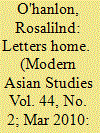

|
|
|
|
|
| Publication |
2010.
|
| Summary/Abstract |
Maratha Brahman families migrated to Banaras in increasing numbers from the early sixteenth century. They dominated the intellectual life of the city and established an important presence at the Mughal and other north Indian courts. They retained close links with Brahmans back in the Maratha regions, where pressures of social change and competition for rural resources led to acrimonious disputes concerning ritual entitlement and precedence in the rural social order. Parties on either side appealed to Banaras for resolution of the disputes, raising serious questions about the nature of Brahman community and identity. Banaras pandit communities struggled to contain these disputes, even as the symbols of their own authority came under attack from the Mughal emperor Aurangzeb. By the early eighteenth century, the emergence of the Maratha state created new models of Brahman authority and community, and new patterns for the resolution of such disputes.
|
|
|
|
|
|
|
|
|
|
|
|
|
|
|
|
| 16 |
ID:
123421
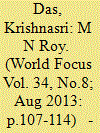

|
|
|
|
|
| Publication |
2013.
|
| Summary/Abstract |
Among the modern Indian thinkers Manabendra Nath Roy was more a philosopher than a mass leader. He was, essentially, one of the greatest thinkers of the twentieth century and truly a citizen of the world. His philosophy may be described as a mid-twentieth century version of the Renaissance modified and enriched by the experience of the intervening centuries.
|
|
|
|
|
|
|
|
|
|
|
|
|
|
|
|
| 17 |
ID:
105589
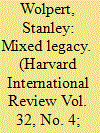

|
|
|
| 18 |
ID:
085502
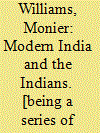

|
|
|
|
|
| Edition |
3rd ed
|
| Publication |
DelhI, Oriental Publishers, 1971.
|
| Description |
365p.Hbk
|
|
|
|
|
|
|
|
|
|
|
|
Copies: C:1/I:0,R:0,Q:0
Circulation
| Accession# | Call# | Current Location | Status | Policy | Location |
| 010937 | 954.029/WIL 010937 | Main | On Shelf | General | |
|
|
|
|
| 19 |
ID:
040815
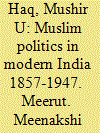

|
|
|
|
|
| Publication |
Meerut, Meenakshi Prakashan, 1970.
|
| Description |
171p.Hbk
|
|
|
|
|
|
|
|
|
|
|
|
Copies: C:1/I:0,R:0,Q:0
Circulation
| Accession# | Call# | Current Location | Status | Policy | Location |
| 004949 | 954.035/HAQ 004949 | Main | On Shelf | General | |
|
|
|
|
| 20 |
ID:
186230
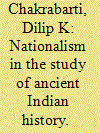

|
|
|
|
|
| Summary/Abstract |
The historiography of ancient India has been an ideological battleground since the
very beginning. The histories of ancient India written during the colonial period by
Europeans were heterogenous in nature. On the one hand, there were works with clear
imperialist imprint such as the ones by E J Rapson, and on the other hand, we have
the pioneering works of Vincent Smith, which are not as imperialist as they are made
out to be. The works of nationalist historians such as R K Mukherji, R C Majumdar, U
N Ghoshal and others were mainly in response to works like those of Rapson. These
pioneering historians of the late 19th and the first half of the 20th century have been
characterized as “Hindu revivalists” by a section of later Indian historians who mostly
belong to the Communist fold. The purpose of the present paper is to put this accusation
in the context of the history of research on ancient Indian history and archaeology
and judge if this is at all true or merely a communist propaganda and ploy to build up
a ‘progressive’ versus ‘obscurantist’ divide among the historians of ancient India. The
paper will also examine how certain currents of thought in modern Indian archaeology
pose a danger to Indian security.
|
|
|
|
|
|
|
|
|
|
|
|
|
|
|
|
|
|
|
|
|